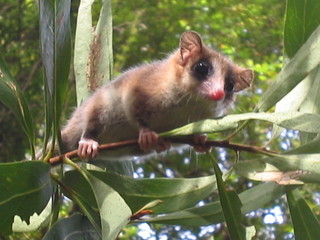Monito del Monte
Category: Marsupial

Facts about Monito del Monte. "Scientific name for Monito del Monte is Dromiciops gliroide". Monito del Monte is Spanish for little bush monkey. Also called chumaihuén or mountain monkey, its formal name is Dromiciops gliroide. Monito del Monte is the only living member of the order Microbiotheria and the family Microbiotheriidae. The Monito del Monte is considered a living fossil, since it is the only living member of a lineage that goes back at least forty million years, to the time when Australia and South America were still connected. Its closest genetic relatives are not South American marsupials like the shrew possums but Australian species like Notoryctemorphia.
The Monito del Monte is a tiny marsupial only found in South America. They are only four to five inches long, with a tail almost as long. They have brown fur with white patches but black rings around the eyes.
Like many opossum species, the Monito del Monte is an omnivore. It eats insects and other invertebrates as well as fruit. It is one of the major seed dispersers in its area, and it is the only known seed disperser for Tristerix corymbosus, an Andean mistletoe.
the Monito del Monte reproduces during the South American summer. The mother has anywhere from one to four young, and they migrate from the vagina to the marsupial pouch that only has four teats. Once the young are weaned, they remain with the mother for several more months. The Monito del Monte are fully mature at two years of age. Unlike other possum species, the young may remain in a loose social group with the mother instead of the solitary lives of species like the American opossum.
Monito del Monte build nests out of water resistant leaves high up in trees or in stands of Chilean bamboo. They sometimes line the nests with moss to camouflage it. They will sometimes shelter underground as well.
The Monito del Monte hibernates during the winter, up to six months at a time. They store their fat deposits near the tail.
Monito del Monte is not considered a threatened species.

 Back To Category Marsupial
Back To Category Marsupial